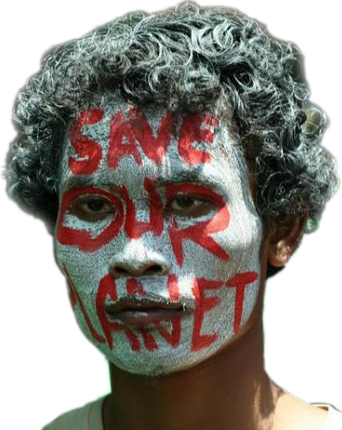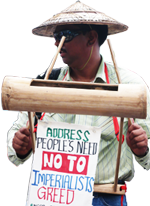Who we are
 The Peoples' Movement on Climate Change (PMCC) seeks to advance the People's Protocol on Climate Change as the Southern peoples' strategy and response to the climate change issue.
The Peoples' Movement on Climate Change (PMCC) seeks to advance the People's Protocol on Climate Change as the Southern peoples' strategy and response to the climate change issue.
What we advocate
|
The Peoples' Protocol on Climate Change (PPCC) aims to involve the grassroots sectors in the climate change discourse by developing their capacities for engagement and action. It also aims to pressure governments and international bodies to put the people's perpectives and aspiration on the negotiating table in drawing up a post-2012 climate change framework. |
Arabic English Amharic Bengali Spanish Francais for printing |
Why we advocate

The people are the worst affected and yet are the least empowered. It is urgent, more than ever, for the people to unite and create their own spaces to raise their own concerns and issues on climate change.
Member Login
Syndicate
PPCC's five-point platform for action
- Comprehensive and concerted but differentiated and equitable global effort to achieve deep, rapid, and sustained emissions reductions to stabilize CO2 concentrations at 350ppm and hold global average temperature rise to 1.5 degrees Celsius.
- Demand the reparation of Southern countries and the poor by Northern states, TNCs, and Northern-controlled institutions to redress historical injustices associated with climate change.
- Reject false solutions that allow Northern states and corporations to continue harming the environment and communities, provide new and greater opportunities for profit, and reinforce and expand corporate control over natural resources and technologies.
- Struggle for ecologically sustainable, socially just, pro-people, and long-lasting solutions.
- Strengthen the peoples' movement on climate change.
| Reflections on REDD+ presentation at the PWRDF office last Oct. 4th. |  |
 |
| Friday, 07 October 2011 10:46 |
|
Climate Change Marketplace
I've just come back to my desk after a fascinating presentation by Maria Theresa Nera-Lauron of the People's Movement on Climate Change. Tetet (only her mother calls her Maria Theresa- and only when she is in trouble!) came to Canada from the Philippines to present in Ottawa and Montreal and now in Toronto on issues relating to climate change and land grabbing. While I won't go into details about everything she talked about (it would fill screens and screens, and I don't want too may tl;dr reactions) I did want to reflect a bit about one topic- REDD+.
REDD+, or Reducing Emissions from Deforestation and Forest Degradation in Developing Countries, is one of the current "solutions" to the climate problem. Looking at the title, it sounds like a great idea. Reduce emissions. Stop deforestation and degradation. Help people in developing countries. It's a win-win-win, right?
If only!
Unfortunately, the policy document for REDD+ contains- in addition to great rhetoric about mitigating climate change and reducing poverty in the developing world- some fine print. "The problem is always in the fine print," Tetet said repeatedly in her presentation.
The fine print in REDD+ allows corporations to do some creative accounting and shift some credits around, allowing them to actually contribute more to deforestation than they could before. In addition, the definition of "forest" has changed in this document.
When I say "forest", what do you think of? I'll bet your image involves large trees, possibly some undergrowth. Maybe some animals- deer perhaps, or foxes, or bears.
Does it involve sugarcane plantations?
No?
Well, according to the documentation of REDD+, plantations will count as "forests", allowing companies to cut down old growth forests and plant sugarcane, pineapples, or other crops.
Does that sound like preventing deforestation to you? I didn't think so!
As Tetet was talking about the dangers of allowing corporations to make the battle against climate change an opportunity for further profit, I thought about Annie Leonard's "The Story of Cap-and-Trade", one of her Story of Stuff series of videos. Rather than going into the details she provided, I will finish today's entry by sharing Annie's thoughts on the corporatization of the battle against climate change.
Tetet and Annie come from very different backgrounds, but they both see the problem in the current situation. Hopefully more of us will see it, too, and will stand up for real change which will help humanity to adapt our behaviours rather than simply mitigating the effects of climate change!
|
Upcoming Events
03 December 2011
11:30 - 13:30
Improving Development Effectiveness in Climate Financing: Challenges and Opportunities

